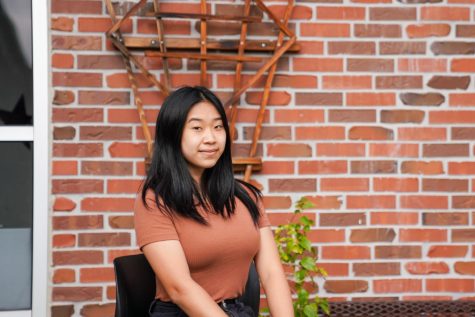Quarantine mottos to live by
Exploring philosophies students and teachers began following due to the pandemic
May 9, 2021
Expect the unexpected
“Expect the unexpected. That’s really been something that I’ve been thinking about a lot since COVID began.”
COVID started a chain of unpredictable events for history teacher Eric Otto. If not for quarantine, he would have never imagined himself teaching from home, or more recently, the shift to hybrid learning. Through these events, he was able to realize that although he had control over his actions, some aspects of his life were completely out of his control.
“I just have to roll with the punches when they come in, but also to look forward to the idea that things will get better and they may get better in unexpected ways,” Otto said.
Whether it was getting vaccinated relatively quickly or spending time with his daughters back home and “working side-by side” with them, Otto was greeted with many silver linings. When thinking of the better parts of quarantine, he says:
“There’s so many things to choose from,” Otto said. “Like the fact that I’m teaching in person right now; that’s something that I didn’t foresee would happen this school year and it has and it’s great. Being back in the classroom, even though it’s with a few students in person and the rest of you online, it makes me feel like a good teacher again [by] just being back in the classroom.”
This mindset allows Otto to feel what he describes as “mentally prepared” for “whatever comes” his way. He believes he is able to think in a more realistic point of view, but at the same time, he is still optimistic about what the future entails as the unexpected has proven to be constructive rather than purely negative.
“I’m hoping that the next string of unexpected events that I’m expecting will be ones that will be positive and will bring about some significant happy change in my life,” Otto said. “So for me, I’m wondering, ‘What’s next? What big surprise lies around the corner?’ And I’m hopeful that whatever that is, it’s going to be something fantastic or miraculous.”
Cherish your time
Ever since sophomore Kelly Tung was five years old, she wanted to raise a puppy. At first, her parents didn’t allow her to because they believed it would be too time consuming. But when quarantine brought more free time and slight feelings of loneliness, Tung found herself cuddling on the sofa with a newly adopted mixed terrier named Coco. If she hadn’t taken this opportunity, she wouldn’t have the puppy that nestles in her lap, accompanying her while doing homework. With that, she understood the importance of cherishing her time.
“Do something that you want to do,” Tung said. “Maybe you’re not sure of doing it, or if there’s something holding you back like peer pressure, or maybe your parents are not super on board with it. But if it’s something that you love, something that you want to do, something that you’ll regret not doing in the future, then I strongly believe that you should pursue it because you never know when you’ll be unable to do something that you want to do.”
It was this same mindset that let her discover that she wanted to set goals to strengthen connections with her friends, family and newly adopted dog. Tung founded the nonprofit organization called the Youth Environmental Power Initiative, which is a youth led organization centered around helping the environment and climate. With the opportunity of time that COVID has given her, Tung strengthened her non profit’s reach, hosting virtual volunteering opportunities to motivate and engage members.
“This is a perfect chance to take the opportunity and do something that would not only connect the community together but also benefit the environment as well.” Tung said.
For Tung, she finds that cherishing her time is not just limited to the pandemic. She believes it can also be applied to our day-to-day lives.
“As people say, ‘Money can’t buy time,’” Tung said. “And I know a lot of high schoolers essentially — I don’t want to say they waste time, that’s not what I’m trying to say — but I feel like a lot of high schoolers sometimes take their time for granted, or they’re like, ‘Oh, I can always do it tomorrow.’ I feel like it’s necessary for me to remind you that you never know what’s gonna happen tomorrow, so if you want to do something, make sure to do it today, make sure to do it now and enjoy the moment.”
Keep an open mind, be flexible
Before the pandemic, Chinese teacher I-Chu Chang considered herself a perfectionist. She planned out every day, watching the second hand on the clock so she could dismiss her classes strictly two minutes before the bell rang. But when MVHS made the shift into distance learning, she discovered new technical difficulties that hindered her ability to teach with her previously set expectations.
“Every time when there was a technical difficulty during testing, I got frustrated inside,” Chang said. “‘Ugh, why does it happen again?’ I got angry at myself for not doing it well enough. And now, even though I try extra hard, I always [work] long working hours — things are different. So I started to accept the fact that we have to kind of loosen up a bit and then just try our best and we keep trying. There are different ways to work on things and everyone has their own limitations or difficulties.”
Chang shares a specific incident where the technical difficulties that came with distance learning put her in a problematic and frustrating position. After watching a multitude of YouTube videos to figure out how to project documents on a screen, her computer suddenly crashed.
“At some point, I thought my computer was going to explode,” Chang said. “I was extremely happy to this point, and then [it all] went downhill to hell. It didn’t work. I didn’t save anything yet. I haven’t updated my stuff. It stopped working, and I was like, ‘Whoa, whoa, what’s going on?’ And it was from heaven to hell. But immediately I thought about what I talked about earlier, stay[ing] flexible. So let’s think about the alternative, there’s gonna be [another] way. If it does happen [that] there’s nothing I can do to fix my computer, what can I do? I accepted it. I started laughing at that moment. Instead of being so panicked, I decided to just loosen up, and two minutes later, my computer went back [to] normal again. So I just feel like I have to calm down. I feel there is a message somewhere that is telling me, ‘OK just relax, I’m testing you, just keep doing things the way that I advise you to.’ So that’s a moment I will never forget because from heaven to hell, I learned to deal with it when I was in hell and it turns out, it wasn’t so bad.”
In order to keep an open mind, Chang constantly reminds herself to reflect on her reactions in the moment. In doing so, it allows her to view situations in a different perspective and see worse situations as something she can move on from.
“I’d laugh it off like, ‘OK, this is a 2020 moment,’ we have to just accept it,” Chang said. “[In] these particular two years, 2020 and 2021, things like this [are] happening constantly to a lot of people in the pandemic,” Chang said. “People lose families all across the globe, job security, there’s so many unpredictable things that I feel like this is an important thing for everyone to be aware of.”















